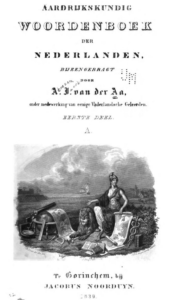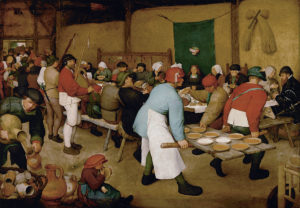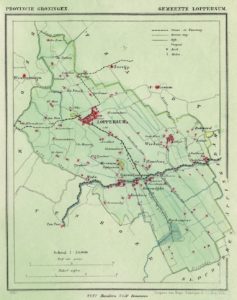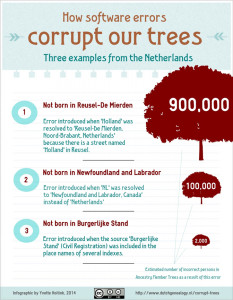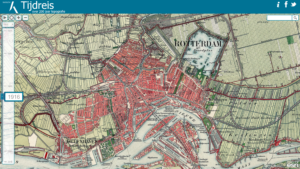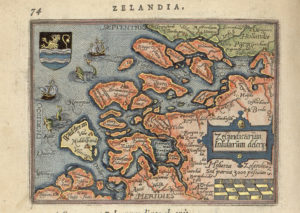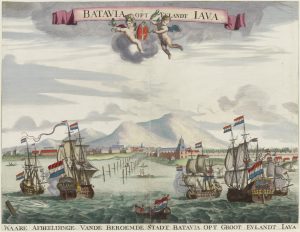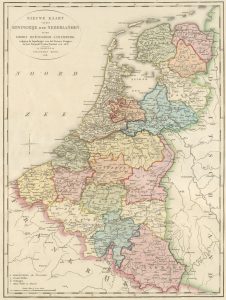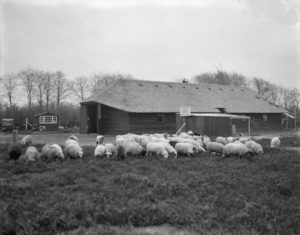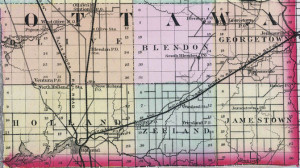Van der Aa's Aardrijkskundig Woordenboek der Nederlanden or geographic dictionary of the Netherlands is a dictionary in 14 volumes that appeared between 1839 and 1854. It contains descriptions of all geographical names in the Netherlands. For cities, towns, and villages, it will give a description of its location, the population including the dominant religions, the main industry and occupations in a town, and any peculiarities Van der Aa found worth mentioning. This gazetteer can be helpful … [Read more...]
Dutch term – Alhier
Alhier means in this location, meaning the place where the record was created. You can often encounter the term in marriage records, where the bride and groom were from alhier. … [Read more...]
Ask Yvette – How to Record Place Names
Dutch Genealogy reader Linda had the following question: In my research, the locations for some births/deaths, etc. are confusing. I'm finding, "Lellens, Ten Boer, Groningen, Netherlands" or just "Ten Boer, Groningen, Netherlands". ALSO "Stedum, Loppersum, Groningen, Netherlands" or just "Loppersum, Groningen, Netherlands", and once, "Stedum, Groningen, Netherlands." Could you please address the correct way to list the locations of births/marriages/deaths? Ten Boer, Loppersum, and Lellens … [Read more...]
Quick Tip – Use “Netherlands” rather than Holland or NL
When recording Dutch place names in your genealogy program, use "Netherlands" rather than "Holland" or "NL." "Holland" is not the name of the country, but of a former province, now split into North-Holland and South-Holland. Some programs in the past tried to resolve Holland and ended up changing it to "Reusel-De Mierden, Noord-Brabant, Netherlands" since there is a street called Holland in that tiny village. It led to millions of corrupt trees. "NL" is sometimes used as an abbreviation … [Read more...]
Quick tip – Topotijdreis website
The website Topotijdreis [Topo Time Travel] allows you to view old topographical maps from 1815 to 2015 of the area where your ancestors lived. Not quite the same as an actual time machine, but it will have to do! You can zoom in on the map or search for places in the top right corner. Different zoom levels have different maps, so be sure to zoom in and out. The slider on the left allows you to select the year that you want to see a map for. You can also hit the play button in the top left … [Read more...]
Dutch term – Eiland
An eiland is an island. The Netherlands has several islands, such as the Zeeland islands in the south-west and the Wadden islands in the north. But there used to be many more. Large parts of the mainland of the coastal provinces used to be islands. The waterways have since been dammed off and reclaimed from the sea. Modern examples of this are the former islands of Urk and Schokland, now part of the province of Flevoland. Earlier examples include the former island of Cadzand in … [Read more...]
Quick tip – Finding the Current Name of an Old Place
When reading old records, you will often come across place names that cannot be found on a modern map. The spelling or the entire name may have changed. For example, the capital of Indonesia, Jakarta, was known as Batavia under Dutch rule. Former Amsterdam City Archivist Simon Hart researched the places of origin that were mentioned in the Amsterdam marriage records. He compiled a list of these places and their old spellings, and the probable place that it refers to. Some examples: … [Read more...]
Quick tip – Did the family hop the border or vice versa?
The borders of the Netherlands have not always been what they are today. The borders were much different before 1839. Several towns that are now in Germany once belonged to the Netherlands, and several Dutch towns were once part of the German states. Also, what used to be the southern part of the Netherlands is now Belgium and Luxembourg. Records of the same town could be in repositories in different countries. It helps to research the history of the town to know where to look. … [Read more...]
Dutch term – Buurtschap
A buurtschap is literally a neighborship. It is a part of a municipality or parish. Unlike a village or town, a buurtschap usually does not have a center or church but consists of a group of farms dotting the landscape. Buurtschap is a word most commonly used in rural parts of the Netherlands. The closest English term would be hamlet. In many places, the buurtschap had an economical and a social function. Often, taxes were collected at the buurtschap level, and each buurtschap would … [Read more...]
Quick tip – Beware of same-named towns
If you are researching immigrants, beware that immigrants often named towns after their place of origin, so there might be two or more places by that name, perhaps thousands of kilometers apart. When a New Netherland records says "Haerlem," did they mean Harlem in current-day New York or Haarlem in the Netherlands? If your Michigan ancestor was born in Holland, was he born in Holland, Michigan or somewhere in the Netherlands? Studying the surrounding records can help, for example if you … [Read more...]
